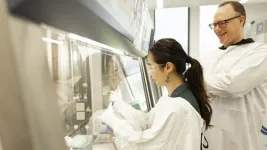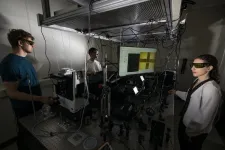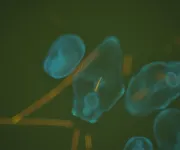(Press-News.org) MINNEAPOLIS – Insurance coverage, ethnicity and location may all play a role in a person’s ability to receive care after a stroke, according to a study published in the July 17, 2024, online issue of Neurology® Clinical Practice, an official journal of the American Academy of Neurology.
“Receiving the right care after a stroke is crucial to recovery and minimizing disability,” said study author Shumei Man, MD, PhD, of the Cleveland Clinic in Ohio and a member of the American Academy of Neurology. “Unfortunately, decisions about care may be influenced by factors such as race, insurance, and geographic location. Our study found a distinct pattern of disparities in care after stroke in the U.S. for uninsured people, especially for uninsured Hispanic people, who had the lowest chance of receiving additional care after a stroke.”
For the study, researchers looked at 1.1 million people who had a stroke. Of the total, over one million hospital admissions were due to ischemic stroke. Race/ethnicity for people with ischemic stroke was 67% white, 18% Black, 9.5% Hispanic, 3% Asian-American/Pacific Islander and 0.4% Native American.
Outcomes after hospitalization were discharged to a facility, such as a rehabilitation facility or nursing home; discharged to home with home health care; or discharged to home with no services.
Overall, 3% of people died in the hospital after ischemic stroke, 36% were discharged to a facility, 15% to home health care, 43% to home with no services and 1% left the hospital against medical advice.
Researchers then looked at race, ethnicity and insurance, comparing each racial and ethnic group within each insurance coverage level. They also looked at geographic regions.
Researchers found that 49% of Hispanic people were discharged to home without home health care compared to 42% of white people. They also found that only 29% of Hispanic people were discharged to a rehabilitation facility or skilled nursing facility compared to 37% of both white and Black people.
Researchers found disparities in service access were affected by insurance status even after adjusting for other factors that could affect care, such as age, the severity of stroke, and other health conditions.
Compared with people with private insurance, people with no insurance were 56% less likely to be discharged to a health care facility over home and 21% less likely to be discharged to home health care services over home with no service.
Among those with Medicare or Medicaid insurance, Hispanic people were 20% less likely to be discharged to a facility over home than white people with the same insurance.
Among those who were uninsured, Hispanic people were 26% less likely to receive home health care than white people. These disparities were not seen among people with private insurance or Black people. Man said, “In fact, compared with white people, Black people were 33% more likely to be discharged to a rehabilitation facility over home, and 42% more likely to be discharged to home health care over home without service.”
When looking at geographic regions, researchers found that hospitals in the New England area were the most likely to discharge a person with a stroke to a facility over home discharge, as well as home health care over home with no health care. A person with stroke would be twice as likely to be discharged to a facility over home if they were hospitalized in New England versus the Pacific region – which includes Alaska, Washington, Oregon, California, and Hawaii – which had the lowest odds of referring people to a facility.
“These findings indicate that targeted efforts are needed to improve access to care after stroke for people without insurance, especially Hispanic people, as well as those in specific regions to ensure optimal recovery and successful community transition for all people across the country,” Man said.
A limitation of the study was that for discharge to a facility, the study was unable to separate rehabilitation facilities from skilled nursing facilities. Another limitation was that not all social factors that could affect a person’s access to care were considered, including the presence of other caregivers at home or whether they were married or had a partner.
Learn more about stroke at BrainandLife.org, home of the American Academy of Neurology’s free patient and caregiver magazine focused on the intersection of neurologic disease and brain health. Follow Brain & Life® on Facebook, X and Instagram.
When posting to social media channels about this research, we encourage you to use the hashtags #Neurology and #AANscience.
The American Academy of Neurology is the world's largest association of neurologists and neuroscience professionals, with over 40,000 members. The AAN’s mission is to enhance member career fulfillment and promote brain health for all. A neurologist is a doctor with specialized training in diagnosing, treating and managing disorders of the brain and nervous system such as Alzheimer's disease, stroke, concussion, epilepsy, Parkinson's disease, multiple sclerosis, headache and migraine.
For more information about the American Academy of Neurology, visit AAN.com or find us on Facebook, X, Instagram, LinkedIn and YouTube.
END
Study: Uninsured, Hispanic people less likely to be referred to care after stroke
2024-07-17
ELSE PRESS RELEASES FROM THIS DATE:
Most Afghans support women’s rights, especially when men think of their daughters
2024-07-17
A majority of people in Afghanistan support human rights for Afghan women, and men are especially likely to support women’s rights when primed to think about their eldest daughters, according to a study published July 17, 2024, in the open-access journal PLOS ONE, by Kristina Becvar and colleagues from the University of Massachusetts at Amherst.
Human rights groups have been concerned for the rights of Afghan women in particular since the Taliban took control of Kabul in 2021. Since then, Afghan ...
New antidote for cobra bites discovered
2024-07-17
Scientists at the University of Sydney and Liverpool School of Tropical Medicine have made a remarkable discovery: a commonly used blood thinner, heparin, can be repurposed as an inexpensive antidote for cobra venom.
Cobras kill thousands of people a year worldwide and perhaps a hundred thousand more are seriously maimed by necrosis – the death of body tissue and cells – caused by the venom, which can lead to amputation.
Current antivenom treatment is expensive and does not effectively ...
Ant insights lead to robot navigation breakthrough
2024-07-17
Have you ever wondered how insects are able to go so far beyond their home and still find their way? The answer to this question is not only relevant to biology but also to making the AI for tiny, autonomous robots. TU Delft drone-researchers felt inspired by biological findings on how ants visually recognize their environment and combine it with counting their steps in order to get safely back home. They have used these insights to create an insect-inspired autonomous navigation strategy for tiny, lightweight robots. The strategy allows such robots to come back home after long trajectories, while requiring extremely little computation and memory (0.65 kiloByte per ...
Soft, stretchy ‘jelly batteries’ inspired by electric eels
2024-07-17
Researchers have developed soft, stretchable ‘jelly batteries’ that could be used for wearable devices or soft robotics, or even implanted in the brain to deliver drugs or treat conditions such as epilepsy.
The researchers, from the University of Cambridge, took their inspiration from electric eels, which stun their prey with modified muscle cells called electrocytes.
Like electrocytes, the jelly-like materials developed by the Cambridge researchers have a layered structure, like sticky Lego, that makes them capable of delivering an electric current.
The self-healing jelly batteries can stretch ...
The most endangered fish are the least studied
2024-07-17
The most threatened reef fishes are also the most overlooked by scientists and the general public. That is the startling finding of a team of scientists led by a CNRS researcher.1 In a study to be published in Science Advances on July 17, they measured the level of human interest in 2,408 species of marine reef fish and found that the attention of the scientific community is attracted by the commercial value more than the ecological value of the fishes. The public, on the other hand, is primarily influenced by the aesthetic characteristics of certain species, such as the red lionfish ...
Mindfulness training may lead to altered states of consciousness, study finds
2024-07-17
Mindfulness training may lead participants to experience disembodiment and unity – so-called altered states of consciousness – according to a new study from researchers at the University of Cambridge.
The team say that while these experiences can be very positive, that is not always the case. Mindfulness teachers and students need to be aware that they can be a side-effect of training, and students should feel empowered to share their experiences with their teacher or doctor if they have any concerns.
Mindfulness-based programmes have ...
New technique pinpoints nanoscale ‘hot spots’ in electronics to improve their longevity
2024-07-17
When electronic devices like laptops or smartphones overheat, they are fundamentally suffering from a nanoscale heat transfer problem. Pinpointing the source of that problem can be like trying to find a needle in a haystack.
“The building blocks of our modern electronics are transistors with nanoscale features, so to understand which parts of overheating, the first step is to get a detailed temperature map,” says Andrea Pickel, an assistant professor from the University of Rochester’s Department of Mechanical Engineering. “But you need something with nanoscale ...
Study shows ancient viruses fuel modern-day cancers
2024-07-17
Peek inside the human genome and, among the 20,000 or so genes that serve as building blocks of life, you’ll also find flecks of DNA left behind by viruses that infected primate ancestors tens of millions of years ago.
These ancient hitchhikers, known as endogenous retroviruses, were long considered inert or ‘junk’ DNA, defanged of any ability to do damage. New CU Boulder research published July 17 in the journal Science Advances shows that, when reawakened, they can play a critical role in helping cancer survive and thrive. The study also suggests that silencing certain endogenous retroviruses can make cancer treatments work better.
“Our study shows that diseases ...
Reef pest feasts on 'sea sawdust'
2024-07-17
Researchers have uncovered an under-the-sea phenomenon where coral-destroying crown-of-thorns starfish larvae have been feasting on blue-green algae bacteria known as ‘sea sawdust’.
The team of marine scientists from The University of Queensland and Southern Cross University found crown-of-thorns starfish (COTS) larvae grow and thrive when raised on an exclusive diet of Trichodesmium – a bacteria that often floats on the ocean’s surface in large slicks.
UQ’s Dr Benjamin Mos from the School ...
Mental health training for line managers linked to better business performance, says new study
2024-07-17
Mental health training for line managers is strongly linked to better business performance, and it could save companies millions of pounds in lost sick days every year, according to new research led by experts at the University of Nottingham.
The results of the study, which are published in PLOS ONE, showed a strong association between mental health training for line managers and improved staff recruitment and retention, better customer service, and lower levels of long-term mental health sickness absence.
The study was led by Professor Holly Blake from the School of Health Sciences at the University of Nottingham and Dr Juliet Hassard of Queen’s ...







